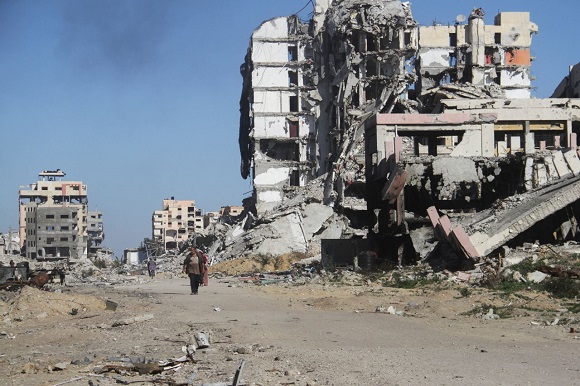A ceasefire in Gaza due to take effect this morning will not happen if Hamas fails to issue the list of the hostages up for release, Israeli Prime Minister Benjamin Netanyahu's office has said.
A long-sought ceasefire for Gaza, where Israel has been waging a powerful military campaign for the past 15 months, was due to start at 8:30am local time today.
But barely an hour before it was set to begin, Mr Netanyahu reiterated a warning first issued yesterday that the deal wouldn't go ahead without a list of three female hostages due to be released on Sunday.
His office said: "The prime minister instructed the IDF (Israel Defense Forces) that the ceasefire, which is supposed to go into effect at 8.30am, will not begin until Israel has the list of released abductees that Hamas has pledged to provide."
Hamas is expected to release the hostages later in exchange for scores of Palestinians imprisoned by Israel, the first step in a long process aimed at winding down the war.
It blamed the delay in handing over the names on "technical field reasons" and said in a statement it was committed to the ceasefire deal.
Sky's Middle East correspondent Alistair Bunkall said he understood this may relate to its difficulties passing messages between its leadership in Gaza. The group has long avoided using mobile phones to prevent detection by the Israeli military.
The Israeli military struck "terror targets" in northern and central Gaza on Sunday morning as the dispute with Hamas delayed the start of the ceasefire.
At least eight Palestinians had been killed and dozens injured in the military strikes, the Palestinian civil emergency service said.
Israeli military spokesman Rear Admiral Daniel Hagari said the army would continue to attack "inside the Gaza arena" until Hamas complied with the agreement and met its obligations.
He said the military was completely ready to implement the ceasefire but it was also ready to act in case Hamas broke the terms of the deal.
Bunkall said: "Many in Israel will naturally blame Hamas for playing games and risking the lives of the hostages and the Gazan people.
"If we're looking for optimism during these tense moments then the fact that Hamas has taken responsibility, rather than blaming Israel, might be encouraging.
"But so many hours and months have been expended during the negotiation of this deal, and thousands of lives lost as round-after-round broke down, so for it to be delayed because Hamas hasn't given the first three names to Israel is deeply frustrating.
"The mediating teams knew the ceasefire would be shaky, they knew that there would be bumps in the road and have encouraged both Israel and Hamas to remain calm as any difficulties are worked through."
The deal was agreed by Israel's cabinet on Friday night after a breakthrough in negotiations mediated by the US, Qatar and Egypt was announced on Wednesday.
In its first stage, the deal would see 33 of the 98 hostages freed over the course of six weeks. About half of the 98 are believed to be alive.
The remainder are to be released in a second phase that will be negotiated during the first.
Between 990 and 1,650 Palestinian prisoners and detainees will be released in exchange, depending on the number of hostages freed.
The deal will also see Israeli forces pull back from some of their positions in Gaza, and Palestinians displaced from areas in northern Gaza will be allowed to return.
Skynews





